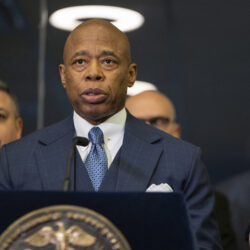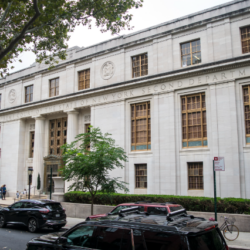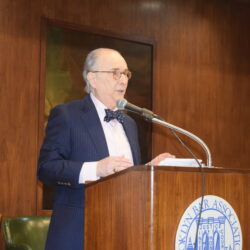
Remembering Judge Jack Weinstein
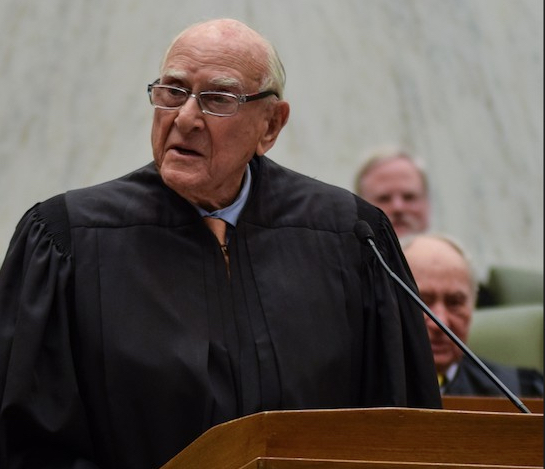
It is with profound sadness that we report the passing of the Honorable Jack B. Weinstein of the United States District Court for the Eastern District of New York, who passed away on Tuesday, June 15, 2021. He was ninety-nine years old. Nominated to the federal bench by President Lyndon B. Johnson in 1967, Judge Weinstein served the District as a judge for fifty-three years, including eight years as Chief Judge, maintaining a full docket of cases until his retirement at the age of ninety-eight last February. Born in Wichita, Kansas, in 1921, Judge Weinstein moved to Brooklyn at age five, where he worked various jobs to help provide for his family during the Depression, including acting on stage, delivering groceries and milk, and working on trucks and docks while he attended Brooklyn College at night, where he received his Bachelor of Arts in 1943. Following the United States’ entry into WWII, he enlisted in the U.S. Navy, where he volunteered for submarine service, retiring as a Lieutenant in 1946. Upon his return from service, Judge Weinstein attended Columbia Law School, from which he received his law degree in 1948. He served as a lecturer at Columbia University from 1948-49, a law clerk to the Honorable Stanley Fuld of the New York State Court of Appeals from 1949-50, and a private practitioner from 1950-52 before returning to Columbia Law School as a tenured professor from 1952 until commencing his judicial service in 1967. During his time at Columbia, he served as the County Attorney for Nassau County, assisted his friend and mentor Thurgood Marshall with briefing as a member of the NAACP litigation team that argued Brown v. Board of Education, and became well known as a legal scholar, authoring numerous books and law review articles, including several of the most authoritative treatises on evidence, mass tort litigation, civil procedure, rulemaking, and administration of the courts. He remained an adjunct professor at Columbia until 1998, and, beginning in 1987 and continuing for several years, he also served as an adjunct professor at Brooklyn Law School. As the New York Times reported when he retired last year, Judge Weinstein was a “legal lion” who championed causes like gun control and school desegregation while on the bench and carved out a niche as a liberal hero during his career — one of the longest in American legal history. He also “led the legal system into an era of mass tort litigation” through his work on groundbreaking cases involving the use of asbestos and the Vietnam-era defoliant Agent Orange, “changing the way huge classes of people claiming injuries from toxins, pollutants and faulty products could get redress in the courts.” More recently, Judge Weinstein publicly called “for more female lawyers to have speaking roles in court” and decried the “‘lack of sentencing alternatives’ for violent young criminals who, he said, are often written off as ‘society’s unredeemables.’” During his term as Chief Judge, Judge Weinstein also helped transform the Court into what it is today — a court that has served and continues to serve as a model of innovation in the administration of justice for the federal courts nationally. Among his many accomplishments, he transformed the way in which magistrate judges were utilized in case management, raising their experience, profile, and visibility in ways that attracted increasingly qualified individuals, a trend replicated nationally; he oversaw the implementation of a court-annexed arbitration and mediation program, a novelty at the time that has become a model for the rest of the country and, indeed, the world; he created the Eastern District Pro Bono Panel and the Eastern District Civil Litigation Fund to support pro bono representation of civil litigants, another innovation that was soon copied in other federal and state courts; and, in keeping with his concern that indigent persons be properly represented, he created the Criminal Justice Act Committee to ensure that the Constitutional guarantee of a right to representation in criminal cases is meaningfully afforded to indigent defendants. The Judiciary has lost a national treasure. Even after his term as Chief Judge, Judge Weinstein continued to innovate and to assist his colleagues in any way he could, once clearing
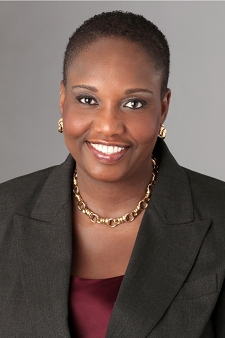
a backlog of approximately five hundred state habeas petitions single-handedly. Beyond his monumental contributions to the law, Judge Weinstein will be remembered for his dedication to family, including his family of law clerks and his EDNY family; for his infectious love and embrace of life, culture, and friendship; and for his relentless pursuit of knowledge and enrichment. He was kind, generous, and supportive of everyone in the EDNY family, including regularly sending handwritten notes of congratulations and encouragement to his colleagues. We all mourn his loss but will celebrate and always treasure his many contributions to the law, the administration of justice, and to the EDNY bench. As the plaque hanging in the Ceremonial Courtroom dedicated to Judge Weinstein on the 50th anniversary of his appointment states, he was a champion of due process and equal access to justice under law; a staunch defender of judicial independence; an innovator in the effective administration of the federal and state courts; a master of complex civil litigation; a distinguished scholar, prolific author, learned professor, and gifted poet; a wise colleague, devoted mentor, and cherished friend; a World War II Navy combat veteran; and a jewel of the federal judiciary.
Leave a Comment
Leave a Comment
